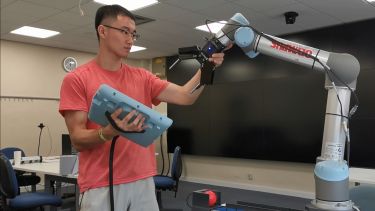Artificial Intelligence for Engineering MSc
School of Electrical and Electronic Engineering,
Faculty of Engineering
-
Start date
September 2025 -
Duration
1 year -
Attendance
Full-time
Explore this course:
Book now for our online postgraduate open day on Wednesday 30 April 2025.

Course description
As the need and scope for robots, smart machines and real-time systems in society grows, so does the market for those trained in autonomous and intelligent systems.
The course covers all major aspects of these control and systems engineering with an emphasis on system autonomy and intelligence.
As you progress, you’ll develop an extensive understanding of artificial intelligence, machine learning, autonomous agents, real-time intelligent systems and intelligent control theory.
You’ll get hands-on experience working with various types of data, hardware and software and you’ll have the opportunity to build a system from scratch using the specialist labs in the University. You’ll be able to take optional modules, including a choice to work with companies to work on real opportunities and problems experienced by industry.
You will also work on a research-level dissertation project of your own where you’ll be able to pick an area you are passionate about and develop a solution to a real world problem in the area.
Accreditation
Accredited by the Engineering Council UK, Institution of Engineering and Technology and the Institute of Measurement and Control.
Modules
Core modules:
- Modern Control & System Identification
-
This module introduces you to advanced state-space control systems analysis and design methods for multivariable systems. The focus is linear time-invariant (LTI) systems in the continuous-time domain, although an introduction is also provided to discrete-time cases and nonlinear cases. You will also be introduced to system identification techniques. System identification uses observations of inputs and outputs from physical systems and estimates dynamical models directly. The theoretical framework and the computational algorithms are explored using synthetic and real problems to show how models can be estimated and validated for future use.
15 credits - Agent-Based Modelling and Multi-Agent Systems
-
This module introduces multi-agent systems and agent-based modelling. It will motivate the many diverse types of complex adaptive system that can be represented and simulated by these approaches (including engineering applications, artificial intelligence and socio-technical systems). The module introduces a set of key theories, methods and tools in the domain of multi-agent systems and agent-based models. You will gain experience of implementing agent-based simulations in state-of-the-art software, building on your experience in object-oriented programming and agile software development methods.
15 credits - Data Modelling and Machine Intelligence
-
All of our lives are affected by machine intelligence and data models - Google is a very visible example. But if you are a victim of identity theft, if you want a loan to buy a house or if you want to pass through immigration at an airport, a model derived from data using some form of machine learning technique will be involved.
15 credits
Engineers increasingly look to machine intelligence techniques such as neural networks and other machine learning methods to solve problems that are not amenable to conventional analysis e.g. by application of Newton's and Kirchhoff's laws, and other physical principles. Instead they use measurements of system variables to compute a model of the process that can then be used in design, analysis and forecasting. System identification is a specific example of data modelling.
We will look at the underlying principles of machine learning, the advantages and limitations of the various approaches and effective ways of applying them with the aim of making you a competent practitioner. - Deep Learning
-
An important field within artificial intelligence is machine learning, which enables systems to learn from data rather than being explicitly programmed to solve a task. Conventional machine learning algorithms tend to rely on a human to carefully engineer and extract features to present to a machine learning algorithm, which can be time-consuming and difficult. A deep learning system, by contrast, takes raw data as input and learns to extract features automatically. This approach has led to significant improvements in processing images, video, speech and audio. Deep learning has also had an impact on the design of intelligent agents, giving rise to the area of deep reinforcement learning, which is where an agent learns in a reward-based framework. An example of deep reinforcement learning is where the Google DeepMind team designed an agent that learned to play Atari computer games to better-than-human-expert level.
15 credits - Multisensor and Decision Systems
-
The ability to use data and information from multiple sources and make informed decisions based on that data is key to many applications, e.g. manufacturing, aerospace, robotics, finance and healthcare. Through effective use of multisensory data and decision making we can reduce uncertainty, improve robustness and reliability, enhance efficiency and ultimately improve the performance of systems. In this module you will develop an in depth knowledge and understanding of multisensor and decision systems and the underlying mathematics and algorithms. You will develop your confidence in solving complex problems requiring the application of multisensory and decision techniques to a wide variety of applications.
15 credits - Control Systems Project and Dissertation
-
The aim of the project is to give you the opportunity to develop further your advanced knowledge and skills and apply these to a specific problem or set of problems. It builds on the taught modules and develops a greater level of independence. You will be allocated a project supervisor with whom you will develop the project specification and who will provide overall guidance on the project. However, you are expected to demonstrate a high level of initiative and independence. You will also develop skills in creative and critical thinking, analysis, reflection, effective project management and communication. The project is very different from many of your taught modules where the lecturer takes the lead in your learning. In the project you are expected to take the lead and the supervisor is expected to provide overall guidance and help.
60 credits - Data Science with Python
-
This module starts with a rapid review of basic background mathematics and statistics, and an introduction to Python. The module will then introduce students to a range of statistical and programming techniques and give practice in their implementation and interpretation using Python. It aims to help students develop the knowledge and experience to select and use appropriate techniques for a variety of problems. The emphasis will be on practical application of techniques and knowledge of their scope rather than development of theoretical underpinnings. Areas to be covered include: exploratory data analysis, simple checks on data, statistical data modelling, programming and optimization. Students will also learn the fundamentals of robust data management and reproducible scientific analysis.
15 credits
Optional modules - up to 15 credits from:
- Text Processing
-
This module introduces fundamental concepts and ideas in natural language text processing, covers techniques for handling text corpora, and examines representative systems that require the automated processing of large volumes of text. The module focuses on modern quantitative techniques for text analysis and explores important models for representing and acquiring information from texts. You should be aware that there are limited places available on this course.
15 credits - Professional Issues
-
This module aims to enable students to recognise the legal, social, ethical and professional issues involved in the exploitation of computer technology and be guided by the adoption of appropriate professional, ethical and legal practices. It describes the relationship between technological change, society and the law, including the powerful role that computers and computer professionals play in a technological society. It introduces key legal areas which are specific and relevant to the discipline of computing (e.g., intellectual property, liability for defective software, computer misuse, etc) and aims to provide an understanding of ethical and societal concepts that are important to computer professionals, and experience of considering ethical dilemmas.
15 credits
Optional modules - up to 30 credits from:
- Machine Vision
-
The module gives knowledge of machine vision methods for a broad range of applications. It introduces you to image and video processing models and methods and provides you with skills on how to embed them in autonomous systems. You will be able to apply the acquired knowledge to both industrial and research areas.
15 credits - Advanced Control
-
The aim of this module is to provide you with an introduction to some of the advanced control techniques used in modern control engineering research and industrial applications. The module will cover both theory and practice, involving analysis and design.
15 credits
Different control techniques and applications may be covered in different years. In all cases, the basic principles and concepts of a particular control technique will be introduced, and comparisons and contrasts will be made with other techniques. Subsequently, the design, analysis and implementation of advanced controllers or control laws will be covered, starting from the requirements of the basic control problem for the application at hand (i.e. stability in the presence of constraints; disturbance and noise rejection). Controller design will be illustrated by industrially-relevant case studies. - Mobile Robotics and Autonomous Systems
-
Robotics and autonomous systems are having an increasing impact on society and the way we live. From advanced manufacturing and surgical robots to unmanned aerial systems and driverless cars, this exciting area is presenting increasing technological challenges. This module provides you with the advanced knowledge and understanding to apply control and systems engineering concepts to the closely related disciplines of robotics and autonomous systems. The module covers theoretical and technical analysis, and design aspects of mobile and manipulator robots with reference to their applications. The module further covers advanced techniques in autonomous decision making for robots and autonomous vehicles.
15 credits - Industrial Training Programme (ITP) in Computational Intelligence
-
This module will provide an insight into advanced computational intelligence systems via industry-relevant project work. This will be in collaboration with an industrial partner. The industrial partner will set a real technical challenge and your group will undertake practical and theoretical work and present a report that will also require an in-depth literature review. To supplement the main technical challenge there will be focused technical seminars on relevant topics. These topics will be provided by both academics and industry engineers. In addition, the industrial partner will provide seminars relevant to both professional and technical skills to help you complete the project.
15 credits - Natural Language Processing
-
This module provides an introduction to the field of computer processing of written natural language, known as Natural Language Processing (NLP). We will cover standard theories, models and algorithms, discuss competing solutions to problems, describe example systems and applications, and highlight areas of open research.
15 credits
The content of our courses is reviewed annually to make sure it's up-to-date and relevant. Individual modules are occasionally updated or withdrawn. This is in response to discoveries through our world-leading research; funding changes; professional accreditation requirements; student or employer feedback; outcomes of reviews; and variations in staff or student numbers. In the event of any change we will inform students and take reasonable steps to minimise disruption.
Open days
Become part of our community of talented postgraduate taught students. Register now to join us at our online open day on Wednesday 30 April 2025.
Duration
1 year full-time
Teaching
There are lectures, seminars, tutorials, individual assignments and a major research project.
Assessment
You’ll be assessed via exams, coursework assignments and a project dissertation.
Your career
Our courses are informed by our strong links with industry and our research. Graduates of this course go on to work as software engineers, developers, AI researchers or data scientists.
Some graduates choose to work in research or follow up their studies with a research degree.
School
School of Electrical and Electronic Engineering
Our engineering graduates imagine, design and develop the advanced technologies and solutions that address big societal challenges.
We have a diverse and vibrant community of students and staff from all over the world and we are committed to provide an inclusive and supportive learning and working environment.
As a student of the Faculty of Engineering you’ll be able to participate in student-led teams and societies where you can apply your engineering skills for example; SunrIde which launch rockets to record altitudes, MarsWorks who develop a Mars rover and Sheffield Bionics who create new technology for healthcare. All of this will help you develop skills for your chosen career.
We are home to the Rolls-Royce University Technology Centre and we’re an integral part of Sheffield Robotics and the Insigneo Institute. We have research contracts with major institutions like the European Space Agency, as well as our many academic and industrial partners. These connections mean our teaching is based on the latest thinking.
Entry requirements
Minimum 2:1 undergraduate honours degree in a relevant subject with relevant modules.
Subject requirements
We accept degrees in the following subject areas:
- Engineering
- Mathematics
- Physics
We may also consider other related subjects
Module requirements
You should have studied at least one Mathematics module and one module from the following areas:
- Further/Advanced Mathematics
- Physics
- Probability and Statistics
- Programming
We may also consider other related modules.
English language requirements
IELTS 6.5 (with 6 in each component) or University equivalent.
If you have any questions about entry requirements, please contact the school/department.
Fees and funding
Alumni discount
Save up to £2,500 on your course fees
Are you a Sheffield graduate? You could save up to £2,500 on your postgraduate taught course fees, subject to eligibility.
Apply
You can apply now using our Postgraduate Online Application Form. It's a quick and easy process.
Contact
Any supervisors and research areas listed are indicative and may change before the start of the course.
Recognition of professional qualifications: from 1 January 2021, in order to have any UK professional qualifications recognised for work in an EU country across a number of regulated and other professions you need to apply to the host country for recognition. Read information from the UK government and the EU Regulated Professions Database.





